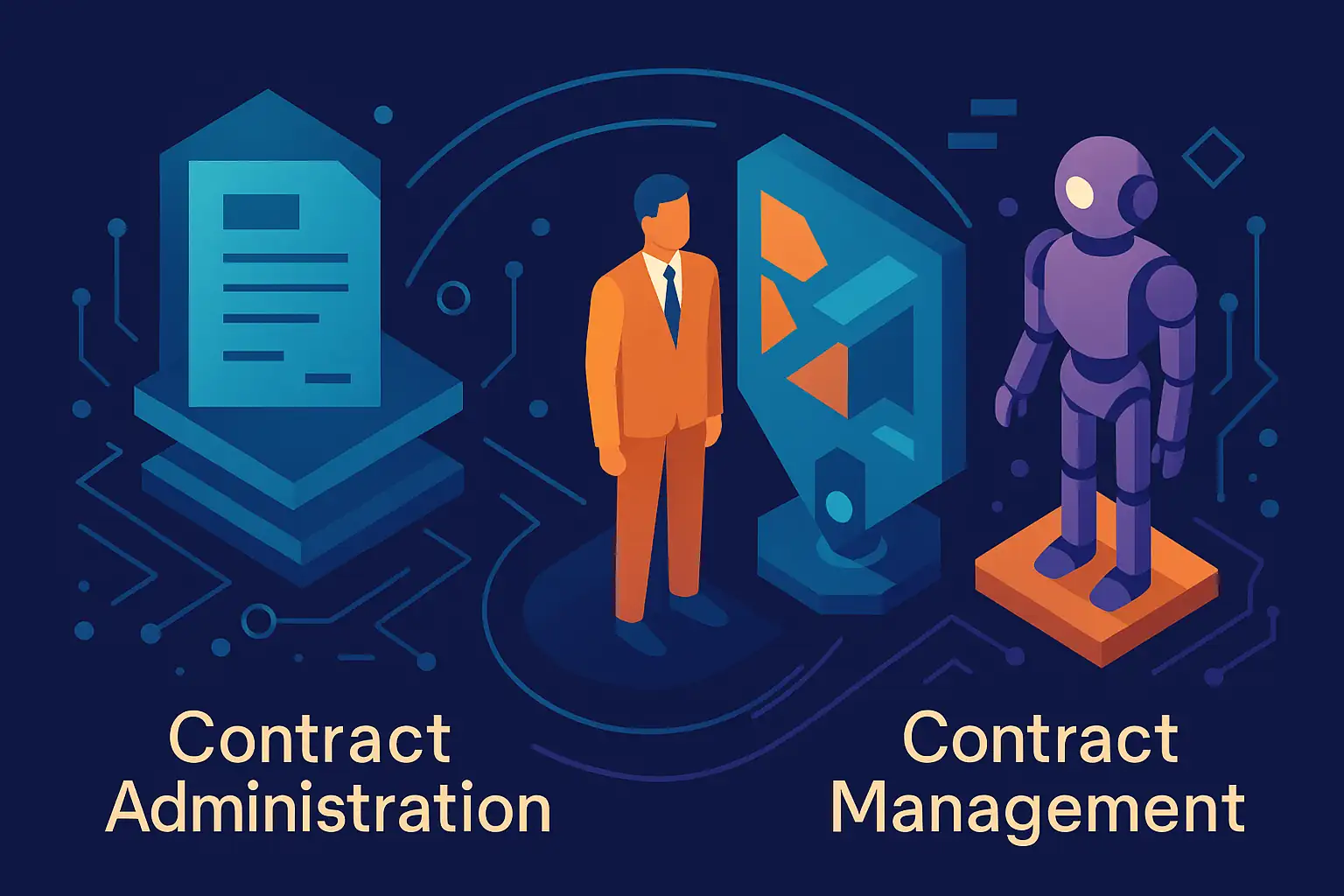Introduction
The terms contract administration and contract management are often used interchangeably, yet they represent distinct processes that play crucial roles in the successful execution of projects. Understanding these differences is essential for industry leaders and project managers who aim to optimize their contract processes and mitigate risks associated with contract disputes.
Contract administration refers to the specific activities and tasks that ensure the terms of a contract are executed as intended. This includes document management, compliance monitoring, and risk assessment, focusing on the operational aspects of the contract once it has been awarded [9][13]. In contrast, contract management encompasses the entire lifecycle of a contract, from drafting and negotiation to performance monitoring and renewal. It emphasizes strategic alignment and value creation throughout the contract’s duration [10][12].
Recognizing the distinction between these two processes is vital in project management. Effective contract administration ensures that all parties adhere to the agreed terms, which is crucial for maintaining positive relationships and avoiding disputes [1][11]. Meanwhile, robust contract management allows organizations to navigate the complexities of contracts, ensuring compliance with legal and regulatory requirements while maximizing the value derived from contractual agreements [11][14].
As we look to the future, forecasting trends in contract management becomes increasingly significant. The future is evolving rapidly, driven by technological advancements and changing business needs. By anticipating these shifts, project managers can better prepare for the challenges and opportunities that lie ahead, ensuring that their organizations remain competitive and efficient in managing contracts [4][6]. This foresight will be essential for adapting to new methodologies and tools that enhance collaboration and reduce risks in contract management over the next decade.
Understanding Contract Administration vs Contract Management
The terms “contract administration” and “contract management” are often used interchangeably, yet they represent distinct phases of the contracting process. Understanding these differences is crucial for industry leaders and project managers aiming to enhance their project outcomes and streamline operations.
Defining Contract Administration
Contract administration refers to the processes involved in executing and maintaining contracts once they are signed. This phase focuses on ensuring that all parties adhere to the agreed-upon terms and conditions throughout the contract’s lifecycle. Key responsibilities in contract administration include:
- Monitoring Compliance: Ensuring that all contractual obligations are met by both parties.
- Documentation Management: Keeping accurate records of all communications, amendments, and performance metrics related to the contract.
- Issue Resolution: Addressing any disputes or issues that arise during the execution of the contract, ensuring fairness and impartiality in decision-making [3][8].
Defining Contract Management
On the other hand, contract management encompasses a broader scope that includes strategic oversight, negotiation, and risk assessment related to contracts. This phase begins even before a contract is signed and continues through its lifecycle. Key aspects of contract management include:
- Strategic Planning: Developing a comprehensive approach to contract negotiation and execution that aligns with organizational goals.
- Risk Assessment: Identifying potential risks associated with contracts and implementing strategies to mitigate them.
- Performance Monitoring: Evaluating the effectiveness of the contract in delivering value and achieving desired outcomes [2][10].
The Interrelation and Importance in Project Management
Both contract administration and contract management are vital to successful project management. While contract administration ensures that the operational aspects of contracts are executed smoothly, contract management provides the strategic framework necessary for effective decision-making and risk management.
- Enhanced Collaboration: When both functions are integrated, they foster better communication and collaboration among project teams, leading to improved project outcomes [4][12].
- Increased Visibility: A clear understanding of both processes allows project managers to maintain oversight of contract performance and compliance, which is essential for timely project delivery [5][11].
- Value Creation: By effectively managing contracts, organizations can create value not only through compliance but also by leveraging contracts as strategic tools for negotiation and partnership [10][14].
Recognizing the differences and interrelation between contract administration and contract management is essential for project managers and industry leaders. As we look to the future, the ability to navigate these processes effectively will be a key driver of success in project management, enabling organizations to adapt to this and maximize their contractual relationships.
Current Trends in Contract Management
As we look towards the future of contract management, several key trends are emerging that are reshaping the industry leaders and project managers. These trends not only reflect the current state of contract management but also set the stage for how organizations will navigate contractual relationships in the coming decade.
- Increased Reliance on Digital Tools and Software Solutions: The shift towards digitalization is one of the most significant trends in contract management. Organizations are increasingly adopting advanced software solutions that streamline contract creation, execution, and monitoring. This transition from paper-based systems to digital platforms enhances efficiency and reduces the time required to manage contracts. For instance, digital contract management has reduced the average time to sign contracts from six days to just 2.5 days, showcasing the impact of technology on operational speed and effectiveness [12].
- Growing Focus on Compliance and Risk Management: As regulatory environments become more complex, organizations are placing a greater emphasis on compliance and risk management within their contract management processes. This trend is driven by the need to mitigate risks associated with contractual obligations and ensure adherence to legal standards. Companies are leveraging technology to automate compliance checks and monitor contract performance, which helps in identifying potential risks early and addressing them proactively [7][8].
- Emphasis on Data Analytics for Informed Decision-Making: The integration of data analytics into contract management is transforming how organizations make decisions. By analyzing historical data and current market conditions, businesses can gain insights that inform contract negotiations and management strategies. This data-driven approach allows for more strategic decision-making, enabling organizations to optimize contract terms and improve overall performance [1][10].
- The Rise of Agile Methodologies Impacting Contract Processes: Agile methodologies, which prioritize flexibility and collaboration, are increasingly influencing contract management practices. This shift encourages organizations to adopt more adaptive contract processes that can respond quickly to changing project requirements and stakeholder needs. Collaborative contract management fosters transparency and engagement among all parties involved, leading to more effective contract execution and relationship management [6][15].
The future of contract management is being shaped by technological advancements, a heightened focus on compliance and risk, the utilization of data analytics, and the adoption of agile methodologies. These trends are not only enhancing the efficiency of contract management but also ensuring that organizations are better equipped to navigate the complexities of contractual relationships in an ever-evolving business sector.
Technological Advancements Shaping the Future
As we look towards the next decade, contract management is poised for significant transformation driven by technological advancements. Industry leaders and project managers must stay informed about these innovations to enhance efficiency, mitigate risks, and streamline processes. Here are the key technological innovations that will influence contract management in the coming years:
- Artificial Intelligence (AI) in Contract Evaluation and Management: AI is set to revolutionize contract management by automating the evaluation process, enabling organizations to analyze contracts more efficiently. With capabilities such as Natural Language Processing (NLP), AI can extract critical data, identify risks, and suggest improvements, leading to unprecedented levels of contracting efficiency and strategic decision-making [2][3]. By 2025, AI-enhanced contract management systems will likely be integral to how businesses operate, allowing for more informed and timely decisions [12].
- Blockchain Technology for Enhancing Transparency and Security: The decentralized and tamper-proof nature of blockchain technology makes it an ideal solution for contract management. It ensures that all parties have access to a single, immutable version of the contract, enhancing transparency and reducing the risk of disputes. As businesses increasingly seek to improve security and trust in their contractual relationships, blockchain will play a crucial role in transforming how contracts are created, executed, and managed [1][10].
- Automation and Its Impact on Contract Lifecycle Management: Automation is set to streamline the entire contract lifecycle, from creation to execution and renewal. By reducing repetitive tasks and ensuring compliance, automated contract management systems will provide organizations with greater visibility into their contracts. This shift will not only enhance operational efficiency but also allow project managers to focus on strategic initiatives rather than administrative tasks [6][9]. The integration of AI with automation will further amplify these benefits, leading to smarter contract management solutions.
- Cloud Solutions Facilitating Collaboration and Accessibility: The adoption of cloud-based contract management solutions will facilitate better collaboration among stakeholders, regardless of their location. These solutions enable real-time access to contracts and related documents, ensuring that all parties are on the same page. As remote work becomes more prevalent, the need for accessible and collaborative contract management tools will grow, making cloud solutions essential for modern project management [10][11].
The future of contract management will be heavily influenced by these technological advancements. By embracing AI, blockchain, automation, and cloud solutions, industry leaders and project managers can enhance their contract management processes, reduce risks, and achieve greater operational efficiency in the years to come.
Shifts in Regulatory and Compliance Landscape
As we look towards the future of contract management, it is essential to consider how evolving regulatory and compliance topic will shape practices in the coming decade. Here are some key trends and anticipated changes that industry leaders and project managers should be aware of:
- Anticipated Changes in Labor Laws: With the ongoing evolution of labor laws, organizations may face new requirements regarding employee rights, wages, and working conditions. These changes will necessitate revisions in contract terms to ensure compliance. For instance, contracts may need to include clauses that address minimum wage adjustments, overtime pay, and employee benefits, which could significantly impact project budgets and timelines. Companies must stay informed about legislative developments to adapt their contracts accordingly and avoid potential disputes [1].
- Growing Importance of Environmental, Social, and Governance (ESG) Factors: As stakeholders increasingly prioritize sustainability and ethical practices, ESG considerations are becoming integral to contract management. Organizations will need to incorporate ESG criteria into their contracts, ensuring that suppliers and partners adhere to environmental standards and social responsibility commitments. This shift not only enhances corporate reputation but also mitigates risks associated with non-compliance. Project managers should proactively engage with legal teams to embed ESG factors into contract negotiations and performance assessments [2].
- Potential Changes in International Trade Agreements: International trade agreements is continually shifting, influenced by geopolitical dynamics and economic policies. Changes in tariffs, trade restrictions, and compliance requirements can have profound implications for contracts involving cross-border transactions. Companies must remain agile and prepared to renegotiate terms in response to new trade agreements or regulatory changes that may affect their supply chains. This foresight will be crucial in maintaining operational continuity and minimizing disruptions [3].
- Preparing for Evolving Compliance Requirements: To navigate the complexities of changing regulations, organizations should adopt a proactive approach to compliance management. This includes investing in contract management systems that facilitate real-time monitoring of regulatory changes and automate compliance checks. Training staff on the latest legal requirements and fostering a culture of compliance will also be essential. By establishing clear communication channels between contract management teams and legal advisors, companies can ensure that all contracts are aligned with current regulations and best practices [4].
The future of contract management will be heavily influenced by regulatory changes, necessitating a strategic approach to contract administration and management. By anticipating these shifts and preparing accordingly, organizations can enhance their resilience and maintain a competitive edge in an increasingly complex business environment.
Skills and Competencies for Future Contract Managers
Project managers and industry leaders must adapt to new challenges and opportunities. The next decade will see significant shifts in how contracts are administered and managed, necessitating a robust set of skills and competencies. Here are the key areas that future contract managers should focus on:
- Importance of Negotiation Skills: In an increasingly complex and competitive environment, negotiation skills will be paramount. Effective contract managers must be adept at negotiating terms that not only protect their organization’s interests but also foster positive relationships with stakeholders. This involves understanding the nuances of negotiation tactics and being able to navigate conflicts that may arise during contract discussions [2][14].
- Strong Analytical and Critical Thinking Abilities: The ability to analyze data and think critically will be essential for contract managers. As organizations handle a growing volume of contracts, the need for strong analytical skills to assess contract performance, identify risks, and derive insights from data will become more pronounced. Critical thinking will enable managers to make informed decisions that align with strategic objectives and mitigate potential issues [8][12].
- Understanding Technology and Data Management: With the rise of digital tools and platforms, contract managers must be proficient in technology and data management. Familiarity with contract lifecycle management solutions, such as cloud-based platforms, will streamline operations and enhance compliance. Additionally, leveraging data analytics will help in tracking contract performance and optimizing processes, making technological literacy a crucial competency for future contract managers[10][15].
- Building Stakeholder Engagement and Communication Skills: Effective communication and stakeholder engagement are vital in contract management. Future contract managers will need to cultivate strong interpersonal skills to build relationships with various stakeholders, including clients, vendors, and internal teams. This involves not only clear communication of contract terms but also active listening and the ability to address concerns and feedback constructively [7][14].
As the field of contract management continues to evolve, project managers and industry leaders must prioritize the development of negotiation skills, analytical thinking, technological proficiency, and strong communication abilities. These competencies will be essential for navigating the complexities of future contract management and ensuring organizational success.
Best Practices for Adapting to Future Trends
Industry leaders and project managers must adopt best practices that not only address current challenges but also prepare for future shifts. Here are some actionable strategies to effectively adapt to the changing environment of contract management:
- Investing in Training and Development for Contract Management Teams: Continuous education is essential for contract management professionals to stay abreast of emerging trends and technologies. By investing in training programs, organizations can enhance their teams’ skills in areas such as digital contract management, compliance, and negotiation strategies. This investment not only improves individual performance but also contributes to the overall efficiency and effectiveness of contract management processes, aligning with the trend of shifting from traditional methods to more strategic approaches[3][5].
- Implementing Flexible Contract Frameworks to Accommodate Changes: The ability to adapt to changing circumstances is crucial in contract management. Establishing flexible contract frameworks allows organizations to respond swiftly to market dynamics, regulatory changes, and evolving business needs. This adaptability is increasingly recognized as a competitive advantage, enabling businesses to manage risks effectively while capitalizing on new opportunities [1][3].
- Leveraging Technology for Better Contract Visibility and Tracking: The integration of advanced technologies such as AI and contract analytics is transforming contract management. By leveraging these tools, organizations can enhance visibility into contract performance, automate routine tasks, and gain insights that drive better decision-making. This technological shift is expected to streamline processes and replace manual reviews, making contract management more efficient and less prone to errors [12][5].
- Establishing a Culture of Continuous Improvement and Innovation: Fostering a culture that encourages innovation and continuous improvement is vital for organizations aiming to stay ahead in contract management. This involves regularly reviewing and optimizing contract processes, encouraging feedback from team members, and being open to adopting new methodologies and technologies. By prioritizing a mindset of improvement, organizations can better navigate the complexities of contract management and enhance their overall performance [8][9].
By implementing these best practices, industry leaders and project managers can position their organizations to thrive in contract management, ensuring they are well-prepared for the challenges and opportunities that lie ahead.
Conclusion
As we look towards the future of contract management, it is essential to recognize the distinct yet interconnected roles of contract administration and contract management within project management. The evolution of these functions is being shaped by several key themes that have emerged throughout this discussion:
- Technological Advancements: The integration of AI and automation is transforming traditional contract management processes, making them more efficient and data-driven. Organizations are increasingly prioritizing contract automation, with a significant percentage earmarking funds for contract technology tools [12][10].
- Strategic Alignment and Sustainability: The future of contract management will be heavily influenced by the need for strategic alignment with business goals and a focus on sustainability. This shift presents opportunities for organizations to enhance productivity while ensuring compliance with regulatory standards [2][9].
- Enhanced Collaboration and Risk Management: As contract management evolves, improved collaboration among stakeholders and better risk management practices will be crucial. These developments are expected to lead to higher returns on investment and overall project success [7][8].
In light of these insights, it is imperative for industry leaders and project managers to remain informed and proactive in adapting to these changes. Embracing the future of contract management not only positions organizations to mitigate risks but also unlocks the potential for increased efficiency and growth. By staying ahead of trends and leveraging new technologies, businesses can enhance their contract management practices, ultimately leading to more successful project outcomes and a competitive edge in the marketplace.
Contract management is set to undergo significant transformations in the coming decade. By recognizing the importance of these shifts and actively engaging with emerging trends, organizations can ensure they are well-equipped to navigate the complexities of contract management in the future.
Find out more about Shaun Stoltz https://www.shaunstoltz.com/about/.
This post was written by an AI and reviewed/edited by a human.



